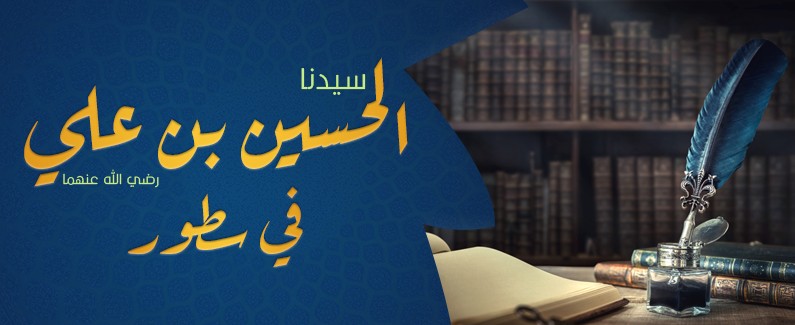In these days, we remember the martyrdom of our master Al-Husayn ibn Ali ibn Abi Talib (may Allah be pleased with them both).
On the day of Ashura in the month of Muharram, more than 1,400 years ago, the master of the youth of Paradise and the fragrant flower of the Messenger of Allah ﷺ was martyred. On this same day, the event of Ashura occurred—when Allah saved Prophet Musa (peace be upon him) from drowning—and the Prophet ﷺ encouraged us to fast on this day.
Because of this coincidence, some people may misunderstand the stance of Ahl al-Sunnah wal-Jama‘ah toward our master Al-Husayn (may Allah be pleased with him), so we would like to clarify in these words:
Who was this brave leader? What are his virtues and status among Muslims? And what is the stance of Ahl al-Sunnah wal-Jama‘ah regarding his martyrdom (may Allah be pleased with him)?
His Lineage, Birth, and Upbringing
He is the noble Imam, master of the youth of Paradise, the son of the lady of the women of the worlds, the fifth of the People of the Cloak (Ahl al-Kisa’), the martyr of Karbala, and the grandson of the Master of the Prophets—Al-Husayn ibn Ali ibn Abi Talib.
His mother is Fatimah al-Zahra, daughter and beloved part of the Messenger of Allah ﷺ, the lady of all women.
His father is the gate to the city of knowledge, the lion of Allah—Ali ibn Abi Talib (may Allah be pleased with him).
He was born in Sha‘ban in the 4th year after Hijrah (as mentioned in Sifat al-Safwah 1/301). He was raised in the care of the Messenger of Allah ﷺ, under his loving gaze and noble care—what an honor and blessing that was.
His Virtues (May Allah Be Pleased with Him)
The virtues of our master Al-Husayn are many and his merits abundant. How could they not be—his grandfather is the Master of the Prophets, his father is the fourth caliph and cousin of the noblest Prophet ﷺ.
Among his virtues is what was narrated from Jabir (may Allah be pleased with him), who said that Al-Husayn once entered the mosque and the Prophet ﷺ said:
“Whoever wants to look at the master of the youth of Paradise, let him look at this one.” — Heard directly from the Messenger of Allah ﷺ (al-Haythami in Majma‘ al-Zawa’id 9/187).
Also from Ibn ‘Umar, who said the Prophet ﷺ said:
“They (al-Hasan and al-Husayn) are my two fragrant flowers from this world.” (Bukhari 3751)
And from ‘Abdullah ibn Mas‘ud, who said the Messenger of Allah ﷺ said:
“These are my sons, so whoever loves them has loved me.” —Referring to al-Hasan and al-Husayn (al-Bazzar in his Musnad, Hadith 2623; al-Tirmidhi 3769)
There are many other hadiths affirming his status, and it is enough that Allah Most High said:
“Indeed, Allah intends only to remove from you the impurity [of sin], O people of the [Prophet’s] household, and to purify you with [extensive] purification.” (Al-Ahzab: 33)
Al-Suyuti (may Allah have mercy on him) mentioned in Al-Durr al-Manthur that:
Umm Salamah (may Allah be pleased with her), the Prophet’s wife, reported that the Prophet ﷺ was in her house lying on a cloak when Fatimah brought him a pot of food. He called Ali, Hasan, and Husayn to eat with him. While they were eating, the verse was revealed. The Prophet ﷺ then covered them with the cloak and said:
“O Allah, these are my family and my special ones. Remove impurity from them and purify them completely.” He repeated it three times. Umm Salamah asked to join them, and he said: “You are upon good.” (Al-Durr al-Manthur 6/603)
His Physical Description
Al-Husayn was among the people who most resembled the Prophet ﷺ.
Ali (may Allah be pleased with him) said:
“Al-Hasan resembled the Prophet ﷺ from the chest up, and Al-Husayn resembled him from the chest down.”
The Stance of Ahl al-Sunnah Towards His Martyrdom
The martyrdom of our master Al-Husayn (may Allah be pleased with him) was one of the greatest tragedies to afflict the Muslim Ummah. Hearts were torn with grief over the death of the master of the youth of Paradise and the fragrant flower of the Prophet ﷺ.
It is unimaginable for a Muslim to rejoice at his death or to celebrate the crimes of his killers, as is sometimes falsely attributed to Ahl al-Sunnah. On the contrary, their condemnation of Yazid is well-known and documented.
Al-Husayn and his noble descendants have a great and revered status among Ahl al-Sunnah wal-Jama‘ah. They are the honorable Ahl al-Bayt.
The Prophet ﷺ said:
“Whoever loves Al-Hasan and Al-Husayn has loved me, and whoever hates them has hated me.” (Ibn Majah 143; Ahmad 7876)
Imam al-Manawi explained the hadith, saying:
“Among the signs of loving them is loving their descendants—looking at them now as one would look at their forefathers if they were present. Their lineage is pure, their offspring are blessed. If one among them errs, his actions are blamed, not his noble self.” (Fayd al-Qadir 6/42)
The scholar Shaykh Yusuf al-Nabahani beautifully said:
You are Ali, Hasan, Husayn, and Zahra,
Covered with the cloak—honored and pure!Their offspring too—noble like them,
Free from all flaws that disgrace creation.Loving them is the garden of love for the lover,
And hatred of them is a path of destruction.
Then he said:
To limit leadership to twelve is error—
Many of you are worthy of being followed.You are all a safeguard for the people of earth,
Without you, the world would perish.You are the defense against misguidance,
Just like the Qur’an is guidance for the seekers.
Commemorating Ashura and Its Relation to the Martyrdom of Al-Husayn
As for fasting on the day of Ashura and the Muslim commemoration of this day, it has no relation to the martyrdom of Al-Husayn (may Allah be pleased with him). It is based on authentic hadiths regarding its virtue.
Ibn ‘Abbas (may Allah be pleased with them) said:
The Prophet ﷺ came to Medina and saw the Jews fasting on the day of Ashura. He asked:
“What is this?”
They said: “This is a good day. This is the day Allah saved the Children of Israel from their enemy, so Musa fasted it.”
The Prophet ﷺ said: “I am more deserving of Musa than you.” So he fasted it and commanded Muslims to fast it.
(Bukhari 1865)
Thus, there is no contradiction between honoring this blessed day through fasting and remembering the martyrdom of our master Al-Husayn (may Allah be pleased with him).
Conclusion
How many lessons can be learned from what happened to our master Al-Husayn (may Allah be pleased with him)—how he faced such trials with patience and contentment. Indeed, trials elevate the believer and increase his rank. Patience in the face of tribulation is a sign of success and the key to triumph.
Were we to expand on this further, we could fill many pages—but what we have mentioned suffices for the one whom Allah has granted insight.
We ask Allah Almighty to make us among those who are accepted, and to gather us under the banner of the Master of the Messengers ﷺ, along with well-being in both worlds. Verily, He is the All-Hearing, Near, and Responsive.
All praise is due to Allah, Lord of the worlds.
https://www.arabicdawateislami.net/blog/363
- Our master Al-Hussein bin Ali, may God be pleased with them both
- Learn about the biography of Imam Hussein ibn Ali, may God be pleased with them both, in brief lines, and learn about his virtues, his status in Islam, and his role in Karbala.
- islam, quran, imamhusain,
Related posts:
 Engineering Design Assignment Help: Making Complex Projects Easier for Students
Engineering Design Assignment Help: Making Complex Projects Easier for Students
 Get Instant Last Minute Assignment Help in Australia by India Assignment Help
Get Instant Last Minute Assignment Help in Australia by India Assignment Help
 AI and Job Security: Discover Which Tech Roles Are Truly Safe in 2025
AI and Job Security: Discover Which Tech Roles Are Truly Safe in 2025
 How to Become a Certified Cybersecurity Expert – Training Options in Chandigarh
How to Become a Certified Cybersecurity Expert – Training Options in Chandigarh
 Career Roadmap: Online Diploma Courses After 10th & Steps to Do MBA After 12th
Career Roadmap: Online Diploma Courses After 10th & Steps to Do MBA After 12th
 How To Integrate AI With MERN Stack?: Future of Full Stack Development
How To Integrate AI With MERN Stack?: Future of Full Stack Development
 From Beginner to Developer: How Coding Bootcamps Prepare You for Real Jobs
From Beginner to Developer: How Coding Bootcamps Prepare You for Real Jobs
 Drama Based Learning: Transforming Education through Creativity and Engagement
Drama Based Learning: Transforming Education through Creativity and Engagement






